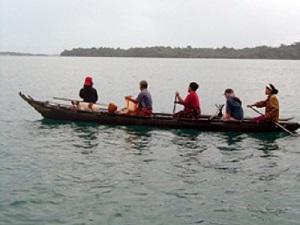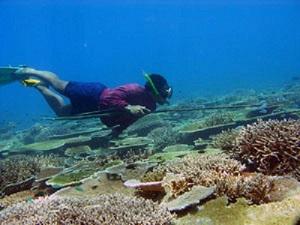Vardhan Patankar
In this study, I plan to document contrasts in pre-tsunami and post-tsunami marine resource-use patterns and management systems, and compare resources and ecological parameters within and outside managed areas to evaluate the effectiveness of traditional management systems in conserving marine resources and habitats.

A traditional dugout canoe setting out on a fishing trip.
The Nicobar Island’s coral reefs were severely affected by the catastrophe of the 2004 tsunami. Studies on tsunami impacts on coral reefs revealed that damage was significant, with changes in the structural framework of the reef, and potential population changes in resources important to human communities. In addition, changes in reef resources and the influence of external factors (e.g. tsunami aid) that followed the tsunami could have affected traditional systems of management.

Nicobari fisherman spear fishing on the reef. © Vardhan Patankar
The islanders are dependent on surrounding reefs for food-security and other indirect benefits and utilize their resources through a traditional system of management. When effective, these systems have been shown to confer reefs with considerable conservation benefits both in terms of diversity and function. The erosion of these systems could have effects beyond the disappearance of cultural attributes and may leave reefs open to rapid over exploitation.
In this study, I plan to document contrasts in pre-tsunami and post-tsunami marine resource-use patterns and management systems, and compare resources and ecological parameters within and outside managed areas to evaluate the effectiveness of traditional management systems in conserving marine resources and habitats.
The results are targeted to inform stakeholders with the knowledge needed to optimise conservation practices. Findings of the project and importance of marine management and reef ecology will be shared with locals through Village Captains, the Tribal Councils and the Nicobar Youth Association. The final report will be circulated/ discussed with the stakeholders through community interactions.